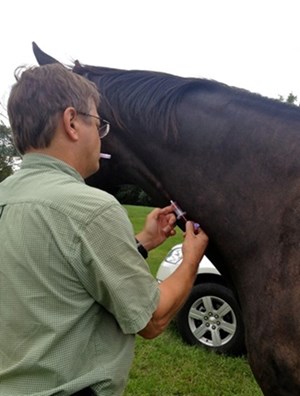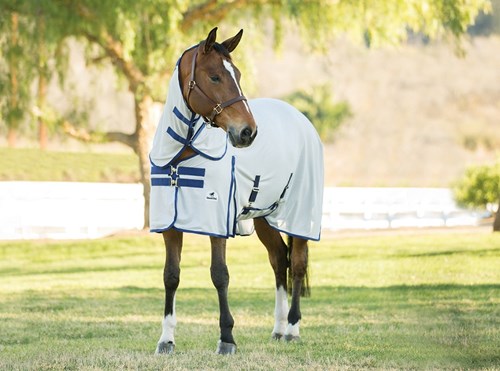Equine Encephalitis:
Eastern (EEE), Western (WEE), and Venezuelan (VEE)
By: Dr. Lydia Gray
What is Encephalitis?
Eastern, Western, and Venezuelan Encephalitis or “sleeping sickness” are viral infections of the brain and spinal cord in horses that are transmitted by mosquitoes. Eastern Equine Encephalitis or “Triple E” is seen mostly in the eastern half of the United States, with the majority of the 116 cases reported in 2016 originating from Florida, Wisconsin, South Carolina, and Louisiana. EEE is the most serious of the three diseases, with a fatality rate of nearly 90%. As the name suggests, Western Equine Encephalitis or WEE occurs mostly in states west of the Mississippi and its mortality rate is much lower, near 50%. Venezuelan Equine Encephalitis (VEE) primarily strikes in Central and South America; a case has not been reported in the U.S. in 40 years.

Signs and Symptoms
Like many infections, Eastern and Western sleeping sickness initially cause listlessness, lack of appetite, and fever, but in less than a day a horse with either disease will show neurologic signs such as:
- changes in behavior (drowsiness, hyperexcitability, and/or apprehension)
- incoordination and a weak, staggering gait
- muscle twitches of the head, neck, shoulder, and flank
- cranial nerve deficits which may include a head tilt, droopy lip, muzzle deviation, blindness, an inability to swallow
- circling and/or pressing the head against walls and into corner
Signs quickly progress to partial or complete paralysis, an inability to rise, convulsions, and death in some cases.
Diagnosis and Treatment

Because there are several diseases and conditions that overlap in their clinical signs with equine encephalitis such as West Nile Virus (WNV), EPM, Equine Herpesvirus-1 (EHV-1), and others, it is important for a veterinarian to obtain an accurate diagnosis in order to provide appropriate treatment and prevent spread if contagious. The veterinarian will take into consideration clinical signs, geographic location and season, and vaccination history, along with diagnostics such as routine bloodwork, spinal tap, nasal swabs, and specific antibody tests to rule in or out each possible cause. Note that some tests can be performed “in-house” or in the veterinary clinic while others must be sent away to a diagnostic laboratory with special equipment.
Because eastern and western encephalitis are caused by a virus, treatment primarily consists of supportive care, which means keeping the horse comfortable and hydrated while the disease runs its course. Intravenous fluids and corticosteroids are commonly given, as well as other medications and care as is necessary in each particular situation. Until diagnosis is confirmed and there is the possibility that signs could be due to another disease or condition such as EPM, specific treatment with additional medications may be administered.
Prevention Tips
By far the most important step horse owners can take to prevent these fatal diseases is vaccination. Any horse that has never been vaccinated against EEE/WEE will need a primary series of two doses, four to six weeks apart, and all horses should be boostered with one dose about a month before the beginning of mosquito season in their area. Horses with poor immunity, at high risk, or that live in an area where mosquitoes are active year-round may need more frequent boosters. Veterinarians are the best resources when it comes to planning and administering these vaccinations.
The second step in preventing equine encephalitis is to control the mosquito population on the farm through these measures:
- Eliminate standing water such as in tires, buckets, wheelbarrows, tarps, and gutters
- Remove trash and debris include plant matter
- Change the drinking water of not just horses but also pets and wild birds regularly
- Use larvicidal products that contain B.t.i., such as Mosquito Dunks
- Apply repellents shown to be effective against mosquitos
- Keep horses inside at dusk and dawn when mosquitoes are most actively feeding
- Use stall and barn fans to move air and fine screens and netting to block mosquitoes
- Apply protective garments such as fly sheets, fly masks, and fly boots or leggings

SmartPak strongly encourages you to consult your veterinarian regarding specific questions about your horse's health. This information is not intended to diagnose or treat any disease, and is purely educational.